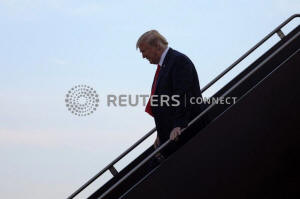Trump gets update from aides on Afghan peace plan with troop pullout
possible
 Send a link to a friend
Send a link to a friend
 [August 17, 2019]
By Steve Holland and Jonathan Landay [August 17, 2019]
By Steve Holland and Jonathan Landay
BRIDGEWATER, N.J./WASHINGTON (Reuters) -
President Donald Trump was briefed on Friday by top national security
advisers on the status of negotiations with the Taliban on a U.S. troop
pullout from Afghanistan and the potential for a political settlement
between the warring sides.
There was no indication that any conclusions were reached at the
session, which took place in a secure conference room at Trump's golf
club in Bedminster, New Jersey.
"Just completed a very good meeting on Afghanistan. Many on the opposite
side of this 19 year war, and us, are looking to make a deal - if
possible!" Trump said in a tweet after the session.
Trump, who has repeatedly questioned the billions of dollars spent in
wars in Afghanistan and Iraq, has made no secret of his desire for a
U.S. pullout from Afghanistan after 19 years of war triggered by the
Sept. 11, 2001, attacks.

But there are deep concerns among national security aides about
negotiations led by U.S. special representative to Afghanistan, Zalmay
Khalilzad, who updated Trump and others on the status of the talks.
A pullout has raised fears within the U.S. military and among some
lawmakers that Afghanistan could plunge into a new civil war that could
see a return of Taliban rule and give al Qaeda and other militants a
sanctuary in which to expand and plot new attacks on U.S. and allied
targets.
A U.S. defense official, speaking on condition of anonymity, said
significant differences remained between the United States and the
Taliban after an eighth round of talks ended in Qatar on Monday.
Some 14,000 U.S. troops remain engaged in America's longest war,
training and advising Afghan security forces and conducting
counterinsurgency operations against militant groups such as al Qaeda
and Islamic State's local affiliate.
U.S. Secretary of State Mike Pompeo said in a statement issued after the
meeting that the United States remains committed "achieving a
comprehensive peace agreement, including a reduction in violence and a
ceasefire" in Afghanistan.
Trump and Pompeo were joined for the talks by Vice President Mike Pence,
national security adviser John Bolton, Defense Secretary Mike Esper,
Joint Chiefs chairman General Joseph Dunford and CIA Director Gina
Haspel.
[to top of second column]
|

President Donald Trump arrives aboard Air Force One at
Manchester-Boston Regional Airport in Manchester, New Hampshire U.S.
August 15, 2019. REUTERS/Jonathan Ernst

"The meeting went very well, and negotiations are proceeding," the
White House said in a statement.
The U.S. military presence dates to 2001 when then-President George
W. Bush invaded in pursuit of al Qaeda and ousted the Taliban rulers
who had given Osama bin Laden and his followers a safe haven in
which they plotted the Sept. 11, 2001, attacks.
U.S. Senator Lindsey Graham, a Trump ally, said any deal should
allow the United States to maintain a military presence in
Afghanistan to pursue such groups.
"Any peace agreement which denies the U.S. a robust
counter-terrorism capability in Afghanistan is not a peace deal," he
said in a statement. "Instead, it is paving the way for another
attack on the American homeland and attacks against American
interests around the world."
A senior administration official said a decision was not necessarily
expected from the Bedminster meeting, but Trump "has been pretty
clear that he wants to bring the troops home."
Both sides had raised expectations of being close to finalizing an
agreement prior to convening the latest round of talks.
The U.S. defense official, however, said differences remained over
U.S. demands that the insurgents publicly renounce ties to al Qaeda
and other militant groups and agree to a nationwide ceasefire, the
official said.
Khalilzad also is seeking the Taliban's agreement to hold direct
negotiations on a political settlement with Kabul government
officials who would be part of a delegation that included opposition
leaders and civil society representatives.
Taliban leaders to date have refused to hold official talks with
Afghan President Ashraf Ghani's government, which they denounce as a
U.S. puppet.

(Reporting by Steve Holland and Jonathan Landay; Additional
reporting by Idress Ali; Editing by Leslie Adler and Diane Craft)
[© 2019 Thomson Reuters. All rights
reserved.]
Copyright 2019 Reuters. All rights reserved. This material may not be published,
broadcast, rewritten or redistributed.
Thompson Reuters is solely responsible for this content. |